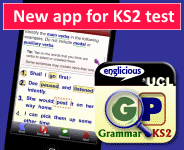Glossary
The Englicious Glossary includes the new National Curriculum glossary terms, which are shown against a white background. However, there's much more to be found here:
- we have added many entries that we feel are important, but cannot be found in the NC Glossary (e.g. connective), and
- in many cases we have added information to the (often very brief) NC entries that need further explanation (e.g. clause and phrase).
Please note that in line with our practice throughout the site, we use capital letters for function terms such as Subject, Direct Object, Indirect Object, Modifier, etc. Although this convention is not followed in the documentation published by the Department for Education we have also done so in the text that forms part of the National Curriculum Glossary.
Tip: Within our units and resources, Glossary items appear highlighted within the text. When you hover over them, or click on them in the Slideshow, a popup is generated.
wh-movement
word
A word is a unit of grammar: it can be selected and moved around relatively independently, but cannot easily be split. In punctuation, words are normally separated by word spaces. Sometimes, a sequence that appears grammatically to be two words is collapsed into a single written word, indicated with a hyphen or apostrophe (e.g. well-built, he’s).
- headteacher or head teacher [can be written with or without a space]
- I’m going out.
- 9.30 am
word class
Every word belongs to a word class which summarises the ways in which it can be used in grammar. The major word classes for English are: noun, verb, adjective, adverb, preposition, determiner, pronoun, conjunction. Word classes are sometimes called parts of speech.
A word class is a group of words which show similar grammatical behaviour. For example, words which belong to the class of nouns occur as the Heads of noun phrases, can be preceded by determiners, and so on.
word family
The words in a word family are normally related to each other by a combination of morphology, grammar and meaning.
- teach – teacher
- extend – extent – extensive
- grammar – grammatical – grammarian

